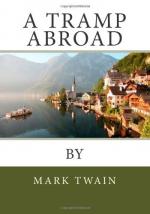I and my agent were the only persons mounted. We were in the post of danger in the extreme rear, and tied securely to five guides apiece. Our armor-bearers carried our ice-axes, alpenstocks, and other implements for us. We were mounted upon very small donkeys, as a measure of safety; in time of peril we could straighten our legs and stand up, and let the donkey walk from under. Still, I cannot recommend this sort of animal—at least for excursions of mere pleasure—because his ears interrupt the view. I and my agent possessed the regulation mountaineering costumes, but concluded to leave them behind. Out of respect for the great numbers of tourists of both sexes who would be assembled in front of the hotels to see us pass, and also out of respect for the many tourists whom we expected to encounter on our expedition, we decided to make the ascent in evening dress.
We watered the caravan at the cold stream which rushes down a trough near the end of the village, and soon afterward left the haunts of civilization behind us. About half past five o’clock we arrived at a bridge which spans the Visp, and after throwing over a detachment to see if it was safe, the caravan crossed without accident. The way now led, by a gentle ascent, carpeted with fresh green grass, to the church at Winkelmatten. Without stopping to examine this edifice, I executed a flank movement to the right and crossed the bridge over the Findelenbach, after first testing its strength. Here I deployed to the right again, and presently entered an inviting stretch of meadowland which was unoccupied save by a couple of deserted huts toward the furthest extremity. These meadows offered an excellent camping-place. We pitched our tents, supped, established a proper grade, recorded the events of the day, and then went to bed.
We rose at two in the morning and dressed by candle-light. It was a dismal and chilly business. A few stars were shining, but the general heavens were overcast, and the great shaft of the Matterhorn was draped in a cable pall of clouds. The chief guide advised a delay; he said he feared it was going to rain. We waited until nine o’clock, and then got away in tolerably clear weather.
Our course led up some terrific steeps, densely wooded with larches and cedars, and traversed by paths which the rains had guttered and which were obstructed by loose stones. To add to the danger and inconvenience, we were constantly meeting returning tourists on foot and horseback, and as constantly being crowded and battered by ascending tourists who were in a hurry and wanted to get by.
Our troubles thickened. About the middle of the afternoon the seventeen guides called a halt and held a consultation. After consulting an hour they said their first suspicion remained intact—that is to say, they believed they were lost. I asked if they did not know it? No, they said, they couldn’t absolutely know whether they were lost or not, because none of them had ever been in that part of the country before. They had a strong instinct that they were lost, but they had no proofs—except that they did not know where they were. They had met no tourists for some time, and they considered that a suspicious sign.




